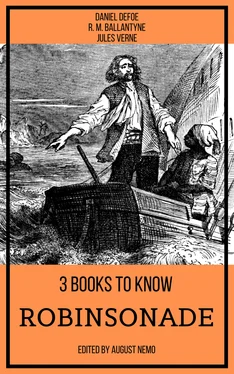“The Diamond Cave!” cried Peterkin. “Then my chance is a poor one, for I could not dive into it if all the pirates on the Pacific were at my heels.”
“Nay, but,” said I, “we will take you down, Peterkin, if you will only trust us.”
As I spoke, we observed the pirates scatter over the beach, and radiate, as if from a centre, towards the woods and along shore.
“Now, Peterkin,” said Jack in a solemn tone, “you must make up your mind to do it, or we must make up our minds to die in your company.”
“Oh Jack, my dear friend!” cried Peterkin, turning pale, “leave me; I don’t believe they’ll think it worth while to kill me. Go, you and Ralph, and dive into the cave.”
“That will not I,” answered Jack quietly, while he picked up a stout cudgel from the ground. —“So now, Ralph, we must prepare to meet these fellows. Their motto is ‘No quarter.’ If we can manage to floor those coming in this direction, we may escape into the woods for a while.”
“There are five of them,” said I; “we have no chance.”
“Come, then!” cried Peterkin, starting up and grasping Jack convulsively by the arm; “let us dive. I will go.”
Those who are not naturally expert in the water know well the feelings of horror that overwhelm them, when in it, at the bare idea of being held down even for a few seconds — that spasmodic, involuntary recoil from compulsory immersion which has no connection whatever with cowardice; and they will understand the amount of resolution that it required in Peterkin to allow himself to be dragged down to a depth of ten feet, and then, through a narrow tunnel, into an almost pitch-dark cavern. But there was no alternative. The pirates had already caught sight of us, and were now within a short distance of the rocks.
Jack and I seized Peterkin by the arms.
“Now, keep quite still — no struggling,” said Jack, “or we are lost!”
Peterkin made no reply; but the stern gravity of his marble features, and the tension of his muscles, satisfied us that he had fully made up his mind to go through with it. Just as the pirates gained the foot of the rocks, which hid us for a moment from their view, we bent over the sea and plunged down together, head foremost. Peterkin behaved like a hero. He floated passively between us like a log of wood, and we passed the tunnel and rose into the cave in a shorter space of time than I had ever done it before.
Peterkin drew a long, deep breath on reaching the surface, and in a few seconds we were all standing on the ledge of rock in safety. Jack now searched for the tinder and torch which always lay in the cave. He soon found them, and lighting the torch, revealed to Peterkin’s wondering gaze the marvels of the place. But we were too wet to waste much time in looking about us. Our first care was to take off our clothes and wring them as dry as we could. This done, we proceeded to examine into the state of our larder, for, as Jack truly remarked, there was no knowing how long the pirates might remain on the island.
“Perhaps,” said Peterkin, “they may take it into their heads to stop here altogether, and so we shall be buried alive in this place.”
“Don’t you think, Peterkin, that it’s the nearest thing to being drowned alive that you ever felt?” said Jack with a smile. “But I have no fear of that. These villains never stay long on shore. The sea is their home, so you may depend upon it that they won’t stay more than a day or two at the furthest.”
We now began to make arrangements for spending the night in the cavern. At various periods Jack and I had conveyed cocoa-nuts and other fruits, besides rolls of cocoa-nut cloth, to this submarine cave, partly for amusement, and partly from a feeling that we might possibly be driven one day to take shelter here from the savages. Little did we imagine that the first savages who would drive us into it would be white savages — perhaps our own countrymen! We found the cocoa-nuts in good condition, and the cooked yams; but the bread-fruits were spoiled. We also found the cloth where we had left it, and on opening it out, there proved to be sufficient to make a bed — which was important, as the rock was damp. Having collected it all together, we spread out our bed, placed our torch in the midst of us, and ate our supper. It was indeed a strange chamber to feast in; and we could not help remarking on the cold, ghastly appearance of the walls, and the black water at our side with the thick darkness beyond, and the sullen sound of the drops that fell at long intervals from the roof of the cavern into the still water, and the strong contrast between all this and our bed and supper, which, with our faces, were lit up with the deep-red flame of the torch.
We sat long over our meal, talking together in subdued voices, for we did not like the dismal echoes that rang through the vault above when we happened to raise them. At last the faint light that came through the opening died away, warning us that it was night and time for rest. We therefore put out our torch and lay down to sleep.
On awaking, it was some time ere we could collect our faculties so as to remember where we were, and we were in much uncertainty as to whether it was early or late. We saw by the faint light that it was day, but could not guess at the hour; so Jack proposed that he should dive out and reconnoitre.
“No, Jack,” said I; “do you rest here. You’ve had enough to do during the last few days. Rest yourself now, and take care of Peterkin, while I go out to see what the pirates are about. I’ll be very careful not to expose myself, and I’ll bring you word again in a short time.”
“Very well, Ralph,” answered Jack; “please yourself. But don’t be long. And if you’ll take my advice, you’ll go in your clothes; for I would like to have some fresh cocoa-nuts, and climbing trees without clothes is uncomfortable — to say the least of it.”
“The pirates will be sure to keep a sharp lookout,” said Peterkin; “so, pray, be careful.”
“No fear,” said I. “Good-bye.”
“Good-bye,” answered my comrades.
And while the words were yet sounding in my ears, I plunged into the water, and in a few seconds found myself in the open air. On rising, I was careful to come up gently and to breathe softly, while I kept close in beside the rocks; but as I observed no one near me, I crept slowly out and ascended the cliff, a step at a time, till I obtained a full view of the shore. No pirates were to be seen — even their boat was gone; but as it was possible they might have hidden themselves, I did not venture too boldly forward. Then it occurred to me to look out to sea, when, to my surprise, I saw the pirate schooner sailing away almost hull down on the horizon! On seeing this I uttered a shout of joy. Then my first impulse was to dive back to tell my companions the good news; but I checked myself, and ran to the top of the cliff in order to make sure that the vessel I saw was indeed the pirate schooner. I looked long and anxiously at her, and giving vent to a deep sigh of relief, said aloud, “Yes, there she goes; the villains have been balked of their prey this time at least!”
“Not so sure of that!” said a deep voice at my side, while at the same moment a heavy hand grasped my shoulder and held it as if in a vice.
I FALL INTO THE HANDS of Pirates — How They Treated Me, and what I Said to Them — The Result of the Whole Ending in a Melancholy Separation and in a Most Unexpected Gift.

MY HEART SEEMED TO leap into my throat at the words; and turning round, I beheld a man of immense stature and fierce aspect regarding me with a smile of contempt. He was a white man — that is to say, he was a man of European blood, though his face, from long exposure to the weather, was deeply bronzed. His dress was that of a common seaman, except that he had on a Greek skull-cap, and wore a broad shawl of the richest silk round his waist. In this shawl were placed two pairs of pistols and a heavy cutlass. He wore a beard and moustache, which, like the locks on his head, were short, curly, and sprinkled with grey hairs.
Читать дальше













